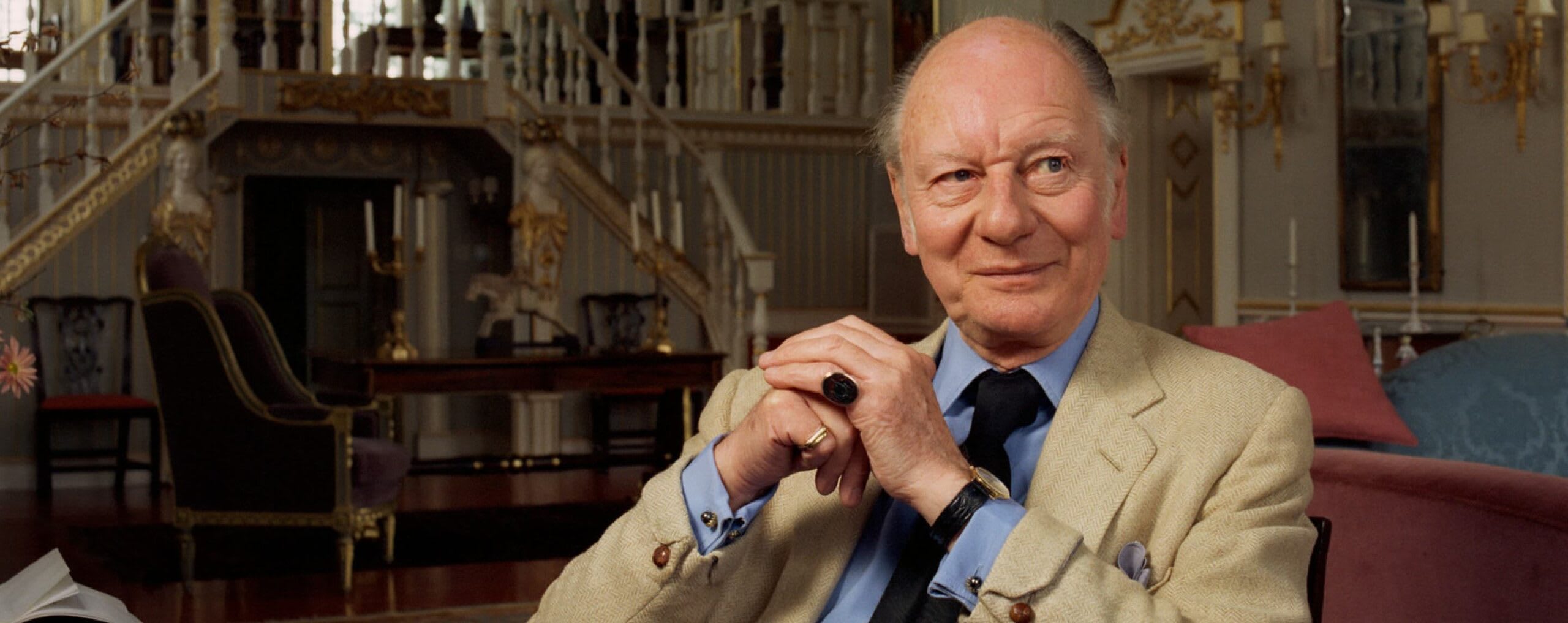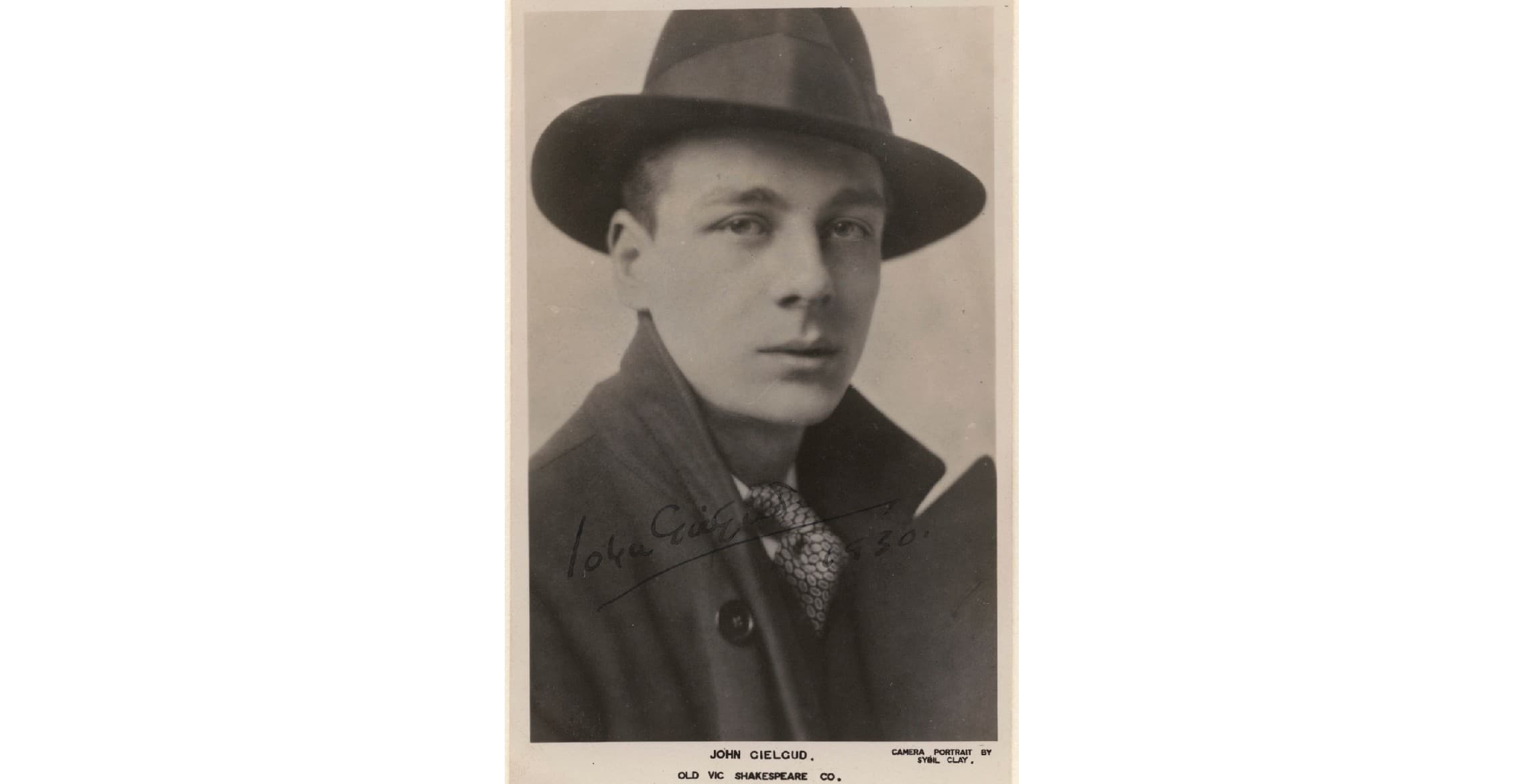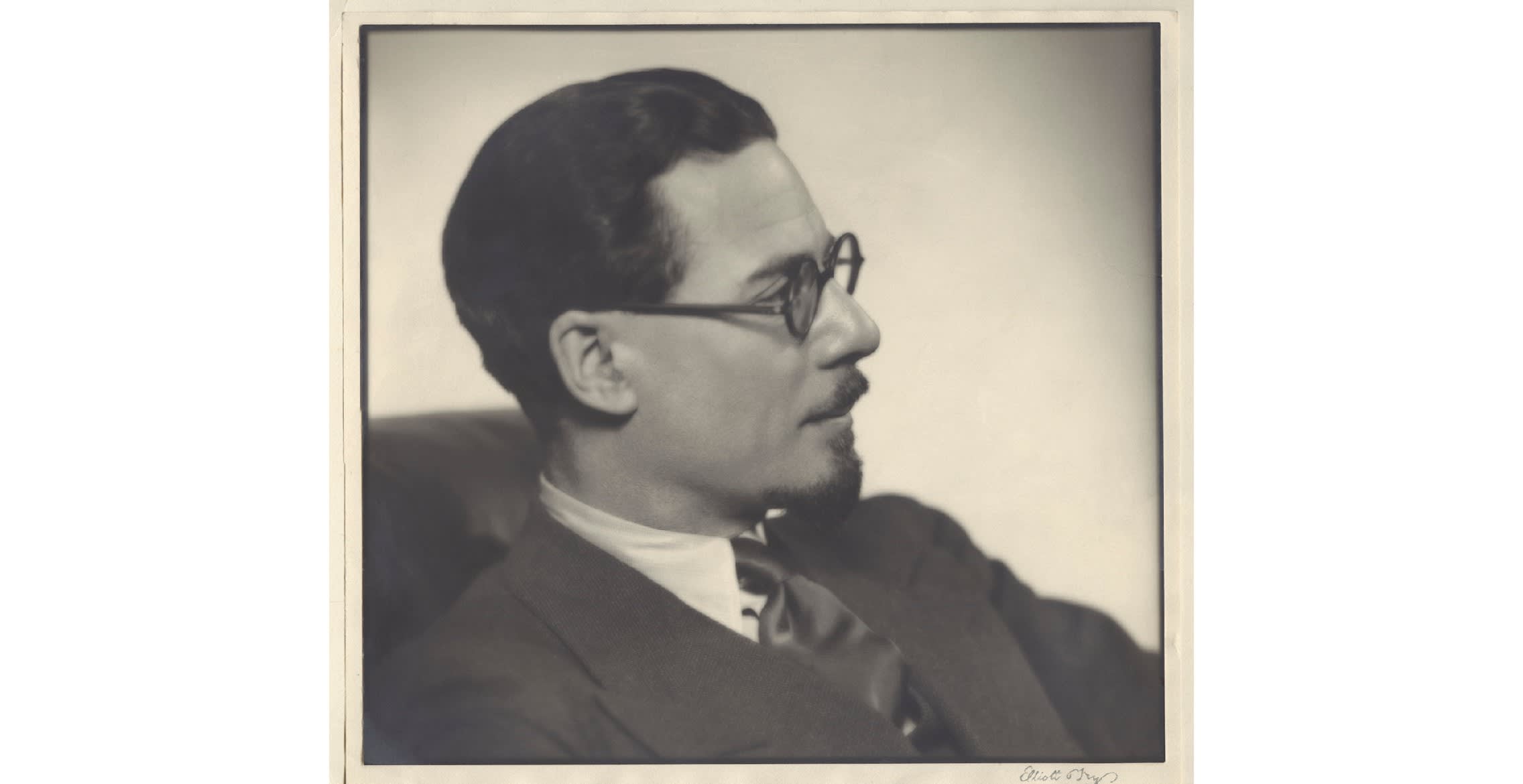On John and Val Gielgud by Professor Tony Howard and Basia Bogoczek
For decades, John Gielgud and his brother Val helped shape the British cultural scene, and spread its influence across the globe – the actor John as a figurehead in theatre and film, especially Shakespeare, and Val behind the scenes as Head of Drama at the BBC.
Although the brothers influenced what we understand by ‘Englishness’, they were of Polish-Lithuanian descent on their father’s side, and perhaps their genealogy sheds light on their sense of identity as third-generation Poles in England in the 20th century.
Their family had owned the Gielgudyszky Castle on the Nemunas river, but their estates were confiscated after General Antoni Gielgudi (born 1792) was killed taking part in the 1830 November uprising. His brother Jan Gielgudi (1794-1877) went into exile with his family and in 1837 found refuge in England. His son Adam (1834-1920) studied law, worked for the War Office, and then campaigned for Poland’s right to independence. He married Leontyna, the daughter of the brilliant Lithuanian actress – and activist – Aniela Asperger (1815 –1902).
Their son Frank (Franciszek) Gielgud (1860-1949) became a stockbroker, but like his father married into a theatrical dynasty. His wife, born Kate Terry (1868–1958), was the niece of the legendary actress Ellen Terry and a cousin of the visionary designer Edward Gordon Craig. John recalled, ‘My father, who was partly Polish, had a curious mixture of practical middle-class English realism mixed with a certain romantic panache.’1 In many ways this sums up the Gielgud’s cosmopolitan history (Val: ‘We are, I suppose, rather an odd family’2) and foreshadowed the brothers’ complex creative choices.
I
From the first, Val and John Gielgud were startlingly productive.
Between 1929 and 1939 alone, John acted in or directed (or both) at least 45 stage plays and three films, sometimes working on three projects in a single day (filming, rehearsing and acting in the theatre). He revisited key Shakespearean tragedies (e.g. Hamlet, Richard II, Romeo and Juliet) many times, refining his work; his productions and his acting established a new classical style: simple, graceful, eloquent.
To quote the critic Michael Coveney at the end of the century, ‘Without Gielgud there would be no National Theatre or Royal Shakespeare Company. He was a pioneer in establishing the first permanent companies in the West End’ 3. Within the commercial sector, in the 1930s, ‘40s, and ’50s he created extended seasons with ensemble casts – nurturing the careers of such actors as Laurence Olivier, Alec Guinness and Peggy Ashcroft and directors including Peter Brook and George Devine (who made the Royal Court Theatre the crucible for modern English drama). Gielgud established Chekhov at the heart of the British theatre repertoire. ‘Playing Chekhov in the twenties and thirties was to us like discovering a new form’, he recalled , suspecting that his interest in these plays stemmed from ‘my Slav ancestry, on my father’s side’ .4
It was in 1929 that John established his reputation by playing Shakespearean leads at the Old Vic – in the same year, Val Gielgud – who had been an actor, a politician’s assistant and a worked for the Radio Times – became Head of Productions at the BBC. For 34 years he ran the largest radio drama department in the world. In 1930 he also launched a technological revolution when he oversaw the first production of a play on television, Pirandello’s The Man with a Flower in his Mouth. He temporarily returned to this new medium from 1949 -52, becoming Head of Television Drama and helping to reshape it for the postwar nation. Throughout his broadcasting career Gielgud aimed to maintain high artistic and literary standards, encourage originality, bring plays to the most democratic British audience ever, and – in parallel with his brother – ‘build a ridge between the business theatres of today and the national theatre of tomorrow.’ 5
Val Gielgud directed countless radio programmes and also wrote (alone or in collaboration) 40 radio plays, 19 stage plays, 29 crime novels, two novels inspired by the Gielguds’ family history, a short story collection, manuals for radio writers, actors and technicians, and four screenplays, one of which, Murder in Broadcasting House, has a significant place in British film history. There is no room here to do more than hint at the depth and breadth of the two Gielguds’ extraordinary careers, but it is possible to suggest the importance of their Polish connection.

II
John’s relationship with the Gielguds’ past was tentative. ’ Father’s parents were both Polish’, he wrote, but ‘I feel I ought to apologise…I have never been able to follow the various ramifications of father’s family, and my mother’s theatrical relations, the Terrys, always had the stronger hold upon my interest.’ 6 Val, by contrast, included a photograph of the Gielgudyszky Castle as the frontispiece to his 1947 memoir Years of the Locust, plus a family tree, and wrote of the Terry dynasty: ‘I admire them as much as I fail to understand them.’ 7
And yet the ‘unpronounceable’ Gielgud surname was precious to John. ‘Our name is Lithuanian…Everyone told me I ought to change it when I first went on the stage, but I was very obstinate on the subject.’ 8 His first commercial success, and his first venture into management, was in Ronald Mackenzie’s Musical Chairs (1932), a study of European expatriates . He received the script in the post:
I was intrigued to find that it took place in Poland, the country of my father’s family….I began to read. The first scene…interested me at once… I finished the play in a mood of great excitement…I wrote to the author, immediately inviting him to lunch…9
Val Gielgud had always felt drawn to Poland. In 192O during the ‘Bolshevik-Polish war’, he visited their elder brother Lewis – who was working in Warsaw with the Red Cross – and kept a diary of his impressions. These later formed the basis for his first novel, Old Swords.
At the Polish frontier Val Gielgud felt ‘a queer and absurd twitch of the heart. I can have no right to feel like an exile coming home – but there it was!’ His impressions as a visiting English member of an aristocratic Polish family were packed with contradictions:
…The military situation seems to be deteriorating every day… Taken this afternoon to pay various calls…. Thence to the old Princess Radziwill, who looked just like the creation of a Victorian novelist… She had all the family-trees of Poland by heart…. There is a distinct panic … There was a great drive for deserters by police patrols in the streets today, who stopped everyone of military age, and demanded papers. …one felt horribly like a deserter. I am left with the firm determination to go back to Poland as soon as any sort of opportunity offers.10
At the BBC, Val Gielgud’s work would be fundamental to the establishment of British radio and to its international reputation. In 1927 he gave a radio talk on Warsaw as one of the great cities of Europe and in 1931 visited his relatives in Krakow when he toured Europe’s new radio stations, giving technical advice and putting the BBC’s motto into practice: ‘Nation Shall Speak Peace Unto Nation’: they ‘sent me abroad to contribute a mite towards international understanding’.
IV
In the autumn of 1939 the Gielguds played a significant role in supporting Poland after the invasion – in Val’s case it would be crucial. ‘To have been compelled to watch the Polish agony from such a very safe distance,’ he would recall, ‘remains as probably the most disagreeable experience I can remember.’11
Within days of the outbreak of war, alongside concerts, anthologies of English literature and Shakespearean extracts (not least from Henry V), Val’s BBC department celebrated Poland’s courage and culture. He was proud of his technically ambitious ‘radio-dramatic treatment’ of the play Chopin, and especially of The Spirit of Poland– ‘the first major effort of radio drama’ of the war.12 Alongside his broadcasts, Gielgud then wrote the commentary to the film The White Eagle (August 1940-March 1941). It focused on a displaced Warsaw boy in London and expanded to give a panoramic sense of the Polish wartime community across the country, from the Polish Library to the Scottish aircrews:
This is the story of a nation in exile, of Poland in Britain. This is the story of people who are now our guests, yours and mine.
In the winter of 1939-40 John contributed to the book Ballet- to Poland (admitting that he knew nothing about ballet). It was published in aid of the Polish Relief Fund, for which he also made a more substantial contribution – a lecture-performance titled Shakespeare in Peace and War. A critic wrote: ‘This recital will never be forgotten by those who witnessed it. It was an epitome of his intelligence, charm and power – an unapproachable model of its kind.’13 Gielgud toured Britain and Asia performing to civilians and troops, and in 1944 he spoke the commentary to the film Unfinished Journey a tribute following the death of General Sikorski:
His life during those last years was… a long weary journey back to Poland, but he was never destined to finish it… others will finish the journey’.
V
In summer 1945 Val Gielgud received an invitation from the Polish Government. He flew to Warsaw with ‘representatives of various aspects of British Culture.’ He kept a diary and was one of the first to report of the country’s condition in the aftermath of war:
Warsaw …Driving into the city in the evening one saw every street the same: a façade of frontages, and then rubble…. But everywhere too there is this amazing vitality, cheerfulness, and busyness-symbolised by flower -stalls in profusion… A woman in the offices of the Red Cross said to me… ‘ We do our best to forget that many of us have only what we stand up in-and that the winter is not very far away.’ …. Imagination boggles at the thought of winter in this place … Went down early to the Old Town to see the hideous ruin of the ghetto….14
The final image in his book of memoirs was of a massive crater, captioned ‘The Royal Palace’.
I am amazed, and, of course, gratified by the quite terrific prestige of the B.B.C. as a result of its war -time activities… I must do what I can on my return to suggest to our European Service that in this direction there is a good humanitarian job to be done.
After the war, Val Gielgud created an educational-cultural model at the BBC with different types of drama targeted at different audiences – in the Light Programme, the Home Service and the Third Programme. It was a ladder that listeners were encouraged to ascend. John’s repertory seasons, similarly, drew theatregoers to Somerset Maugham one night, Jacobean tragedy the next. But after decades of leadership, both brothers were widely described as conservatives, at odds with new forms and writers. John was knighted in 1953 but ‘’I found myself tired, empty of ideas, less adventurous, more apprehensive of choosing badly.’ 15 For example he refused to act in Samuel Beckett’s Endgame, and his brother rejected Waiting for Godot: ‘I hate Beckett, I hate Pinter’, Val told a BBC colleague. But despite his prejudices Val Gielgud encouraged his team to commission their work. In the 1970s John opened up a reborn, adventurous, career, for example playing Pinter in Britain and America. And in 1979 he acted in Poland.
John Gielgud appeared in Wajda’s The Conductor as a Polish musician returning home at the end of his life. His casting was part of Wajda’s project to establish contemporary Polish cinema on the world scene, and the veteran actor’s admiring letters echoed his brother’s diaries long before:
17 June 1979: Everyone marvellously kind and helpful…everything improvised and translated. And shot in one or two takes only, mostly with hand-held cameras as they can’t afford expensive American equipment… [B]reliant director…The Poles have wonderful manners and are defiantly hard-working and optimistic despite all sorts of dreary stringencies and lack of comfort and luxuries of all kinds. 16
But on 17 January 1982 he wrote:’ ’Wajda and his wife… are rumoured to have been arrested’ – and such events were ‘making acting suddenly seem so unimportant.’ 17 Four years later he was in Poland again, considering the ethics of acting. He was filming inside Auschwitz.
He had accepted a leading role in the international tv series War and Remembrance In Poland, Gielgud visited his relatives and researching his role, he told interviewers, took him six months. This time he played an expatriate Jewish-American scholar, raised in Poland, who believes himself detached from the escalating Holocaust. He dies in the gas chamber. It is another story of an elderly man rediscovering a half-forgotten identity. In Poland in 1945 Val Gielgud was accompanying the producer of an historic documentary. He wrote: ‘I am a little ashamed to confess that this morning I shirked seeing a horror-film of the Oswiecim camp.’ In 1986 his brother became one of the first actors ever to film in the camp. In a series of press interviews the 84-year-old actor shared his thoughts:
Whether you’re playing King Oedipus or Hamlet… you are probably portraying the misery and suffering of other people. And you learn to do that as part of your work…. it`s all lifted on to a more poetic plane so that you can make it a rather imaginary thing, whereas this is a real thing, and it`s so recent.’ 18
‘I’ve tried not to be too aware of the horror of it’19, Gielgud said, but when they filmed at night in Auschwitz itself, re-enacting the arrival of cattle trucks and the ‘selection’, ‘There were the great lights over the crematorium, and the police dogs and the queues of people…. That was…fearfully repulsive.’
The recreation of the actualities that took place and not so long ago was appalling. It haunts me, and it haunts the victims who survived.
Just before his death in 2000, Gielgud recorded his final performance. He at last appeared in the work of Samuel Beckett, in a film of Catastrophe, a play written in solidarity with the persecuted dramatist Vaclav Havel. He again played a victim, an aging body on display, deprived of freedom and even speech, but indomitable.
John Gielgud was famously self-critical and wrote disarmingly in 1939 that his besetting sin, was ‘a lack of interest in anything not immediately concerned with myself or with the theatre’.20 It wasn’t quite true.
1. Interview, Great Acting: John Gielgud. Broadcast BBC1, 12.2.1966.
2. Val Gielgud, Years of the Locust. London and Brussels: Nicholson and Watson, 1947.
3. Daily Mail, 14.4.1999.
4. John Gielgud, Stage Directions. London: Heinemann 1963, p.85.
5. Quoted, Asa Briggs, The BBC: The First Fifty Years. Oxford:Oxford University Press, p. 127.
6. John Gielgud, Early Stages. London: Macmillan 1939, p.13.
7. Val Gielgud, Years of the Locust, p.11.
8. John Gielgud, Early Stages, p12
9. John Gielgud, Early Stages, p. 150.
10.Diary extracts from Val Gielgud, Years of the Locust, pp.33-41: ‘Poland 1920’.
11. Ibid, p.170.
12. Ibid. p.171.
13. Hallam Fordham, John Gielgud: An Actor’s Biography in Pictures. London: John Lehmann 1952, p.99.
14. Diary extracts from Val Gielgud, Years of the Locust, pp.193-204: ‘Poland 1945’.
15. John Gielgud in Hallam Fordham, John Gielgud,p.121.
16. John Gielgud, Gielgud’s Letters. London: Phoenix 2004, p.424.
17. Ibid, p.438.
18. Chicago Tribune, July 13, 1986.
19. New York Times, June 2, 1986.
20. John Gielgud, Early Stages, p.229.
Tony Howard is Emeritus Professor of English and Comparative Literature at the University of Warwick. His publications include Women as Hamlet: Performance and Interpretation in Theatre, Film and Fiction (Cambridge: Cambridge University Press, 2007).
Barbara Bogoczek is a translator and interpreter based in London. Her literary translations, with Tony Howard, include Wyspiański’s The Hamlet Study and the Death of Ophelia (London: Shakespeare’s Globe, 2019) and the works of Tadeusz Różewicz, Ewa Lipska, and Maria Pawlikowska-Jasnorzewska.




